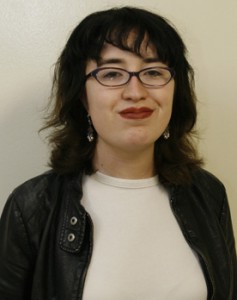Harvard-bound Sang feels ‘empowered’ by Cornell
A broad range of coursework and activism have led Caroline Sang ’08 to the pursue a masters in theological studies at the Harvard Divinity School, focusing on women, gender and sexuality in religion. At Cornell, she majored in women’s studies and sociology/anthropology, with a minor in religion. She plans to later pursue a doctorate in anthropology.

What was best about women’s studies at Cornell?
My experiences within Third Wave Resource Group, Women’s Action Group, and the unique community at Harlan House helped me to overcome my shyness and develop confidence in my abilities as a scholar, activist, and leader. Affiliation with the women’s studies program most definitely facilitated that transformation.
In what ways?
Classes like Women on the Verge with Shannon Reed and Sociology of Gender with Erin Davis often feature a ‘do something’ project. These projects help to encourage even the shyest of students to realize that if you want to change the world, you have to start trying to be that change.
What activist projects did you participate in?
I was involved in the set up of the Clothesline Project every year which commemorates the experiences of victims of sexual assault with TWRG and WAG. I also gave a presentation and created a workbook about Menstruation and Spirituality for a WAG event designed to raise awareness of health concerns and issues of body image and self esteem in young females. The biggest project I ever undertook was bringing the documentary “Walking The Line” to campus by myself and creating an event around the showing to help raise awareness about vigilantism, immigration, civil rights, and racism along the U.S. / Mexico border.
Do you feel well prepared for grad school at Harvard?
I could not have been any better prepared! The Women’s Studies Senior Seminar focused on the reality of how women’s studies and other departments are created, maintained, and run in a college or university and how scholarship has changed over the past few decades. This class really gave me a realistic idea of what graduate study would be like and what life is like as an academic. I would have been quite intimidated by the kinds of questions Harvard representatives ask prospective students had I not taken this capstone course with Aparna Thomas.
Why divinity school?
It never occurred to me to explore a graduate program in religion until I took The Hindu Vision with Joseph Molleur, where I became extremely excited about attitudes toward sex and gender in Hinduism and Buddhism. Several blocks later, I found myself engrossed in a research paper on LGBTQI Vaishnavas for Diane Crowder’s women’s studies course and exploring the work of Diana Eck at Harvard Divinity School. Were it not for this continued train of thought that was generated in Prof. Molleur’s class and strengthened in the women’s studies program, I might never have found myself at Harvard.



